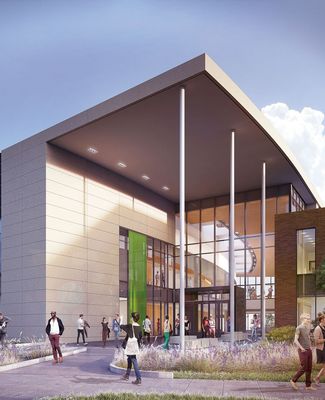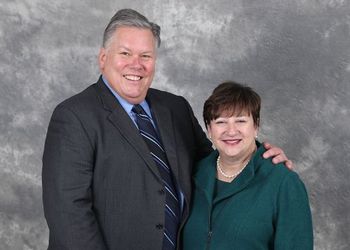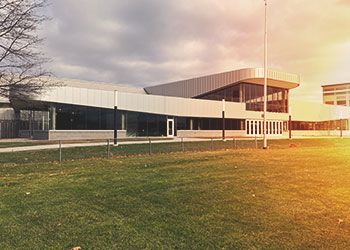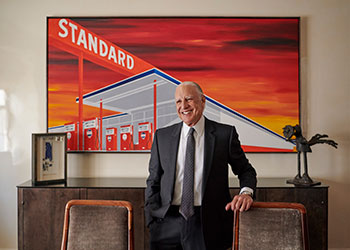One Building Can Change Everything
The right spaces change lives, and, with you, MSU will build them.

One Building Can Change Everything
The right spaces change lives, and, with you, MSU will build them.
February 23, 2017It’s Tuesday morning, and Kari Jurewicz closes her laptop and heads to her first class. Along the way she notices a few classmates in one of the team rooms. They wave her in. Did she hear that they’d be videoconferencing with alumni in Six Flags’ corporate accounting office in class? They make a plan to catch up later over coffee to share ideas on their upcoming presentations, right after the International Business Organization’s meeting on the second floor.
This isn’t a real day in Kari’s life as a senior accounting student and president of the Student Senate in the Eli Broad College of Business, but she knows it could be if the Business College Pavilion becomes a reality.
The College of Business building project, along with plans for the Grand Rapids Research Center and athletic facilities like an addition to the Breslin Center, are major goals of the Empower Extraordinary campaign, ones that will also play major roles in the quality of experiences for MSU students.
Creating a learning community
Learning doesn’t stop when class time ends.
MSU has long been a leader in promoting extracurricular learning opportunities by involving students in research, study abroad, and service learning, and, most recently, by building strong neighborhoods through the residence hall system. New academic, research, and athletic facilities will foster the social side of learning in places where students spend just as much time.
“Right now, students sit on the floors in hallways, or have to leave the complex altogether to meet and work together,” says Kari.
She says the idea of the pavilion, which will include places for casual meetings as well as planned activities, already is instilling a sense of pride and confidence in students.
“It goes beyond words knowing that a community wants to invest to help you accomplish personal goals,” she says. “It sets the precedent that Broad is a community where people help others and challenge them to test new limits.”
A great academic facility encourages a sense of belonging and a lifelong attitude for learning, says Sanjay Gupta, the Eli and Edythe Broad Dean of the college. He believes the pavilion is an essential element to continue to build the college’s network.
“It is extremely important to create the right kind of spaces to attract top talent in terms of students, faculty, and corporate and employer partners,” says Gupta. “There has got to be an element around pride in who we are and where we have come from, and to have a facility that matches up with our aspirations.”
“The quality and value of the experience for the size and scale of our operations clearly distinguishes the Broad College from other schools,” says Gupta. “We are extremely committed to making every student’s experience personal. But we have reached the point where we cannot maintain our status without better physical spaces.”
Executive Associate Athletics Director Jim Pignataro, who oversees student athlete support services, also sees how facilities build community. The expansion and renovations at the Breslin Center, he says will make MSU basketball training second to none and showcase the accomplishments of past generations through the new Tom Izzo Hall of History.
“The demands on student-athletes are immense, so spaces that maximize their time help them to stay on top of academic pursuits as well as to compete at an elite level,” Pignataro says. “The new Breslin will do all that as well as create a shared sense of pride in accomplishment for the whole Spartan community.”
Engaging students
Michigan State took the top spot for student engagement among public research universities in the recent inaugural Wall Street Journal/Times Higher Education College Ranking. It’s a measure of how connected students are with their school, each other, and the outside world, as well as how challenging their courses are and whether critical thinking has been fostered.
Physical environments have a big influence on an active learning experience. Critical thinking is not just handed from the faculty to the students, explains Brian Pentland, a faculty leader in the Broad College and the Main Street Capital Partners Intellectual Capital endowed professor.
“We can provide scaffolding, but the students need to help each other learn how to climb, and catch each other when they fall,” he says. “That kind of active learning requires class discussion and group work.”
For Pentland, the ideal classroom would place students so they can see and interact with one another, not sitting in neat rows facing a lecturer. And the room would have the flexibility to quickly reconfigure the space to break students into groups to collaborate on solving problems.
This kind of arrangement is called a “flipped classroom.” The flip occurs as students listen to lectures online on their own time and come to class ready to do the “homework” together.
“If you put me in a lecture hall, I am going to lecture,” Pentland says. “That would be a shame, because lecturing is one of the worst ways to facilitate learning. Everyone just sits and listens. Nobody is doing any climbing.”
This kind of active learning is a priority not only for the Broad College of Business. The Grand Rapids Research Center will similarly expand the hands-on research experience of medical students with some of the world’s foremost researchers. More than 90 percent of students in the College of Human Medicine participate in research with faculty, compared to the national average of about 68 percent.
“This facility connects our students to scientists who question everything,” explains Norman Beauchamp, Jr., dean of the college. “Being exposed to some of the best researchers in the world will allow our students to one day stand out as physicians who look for ways to make the world better.”
MSU student-athletes will also find increasing opportunities for meaningful engagement.
“We are preparing them for what are they are going to do after sports almost immediately,” Pignataro explains. “The right spaces keep them connected, which allows more opportunities for leadership development and community service so they can graduate with a competitive edge for their careers.”
Momentum in Fundraising
Over the past decade, MSU has built, renovated, and renewed facilities by relying primarily on research support, student housing funds, and private gifts. Increasingly, private support is necessary for MSU to provide the best learning environments for students and faculty.
“The quality and value of the experience for the size and scale of our operations clearly distinguishes the Broad College from other schools,” says Gupta. “We are extremely committed to making every student’s experience personal. But we have reached the point where we cannot maintain our status without better physical spaces.”
Eli and Edythe Broad jump-started the Empower Extraordinary campaign with a $25 million challenge gift, $10 million of which created a matching program for the business pavilion to inspire giving from other donors. It’s working. The entry plaza will be named for donors Bob (’64) and Anna Lou Schaberg, who made a $2.5 million gift, and the career management center will be named for Russ Palmer (’56), who made a $2 million gift. Recently, Scott and Pat Eston (both ’78) established the Scott and Pat Eston Fund for Sustainability with a $400,000 gift to boost the project’s commitment to sustainable design, which in turn will serve as a tangible vehicle to help students understand the implications of sustainability in business decisions.
Alumni and corporate donors are also responding. Lear Corporation, previously the lead donor for the career management space in the basement of the Eppley Center, is a leader in the new effort. The company CEO, Matthew Simoncini, saw the value in the connection Lear had with MSU, and made a call for a five-to-one match for every dollar a Lear employee gave to the project.
Alumni Jason Cardew (’92, ’00), a Lear vice president, and Ray Scott (’02), executive vice president and president for seating, invited Dean Gupta to speak to employees, expecting 30 to 40 people. More than 200 packed the event. To date, through the Lear Corporation Charitable Foundation, Lear and its employees have given $1.5 million for the pavilion.
To help construct the Grand Rapids Research Center, MSU announced in May 2016 gifts of $15 million: $10 million from Richard and Helen DeVos and $5 million from Peter and Joan Secchia. And in October, Dan and Jennifer Gilbert announced a $15 million gift to support the Breslin Center as well as other MSU programs.
But more remains to be done. Attractive naming opportunities remain for donors to have an impact.
In the end, the impact of a building can never be measured by its cost or the number of square feet. The true measure is in the upward mobility of students who will come and fill those places and use them to achieve their dreams.
Business College Pavilion – $23M raised toward $60M goal
A state-of-the-art facility, the pavilion will significantly enhance the college’s commitment to innovation, collaboration, and culture change. It will bring all of the college’s graduate programs under one roof, co-locate career management and services for undergraduate and graduate students, offer flexible classrooms, and provide open-collaborative and team spaces for the entire Broad College community. The building will reflect the kind of accomplishments Spartan businesspeople have achieved worldwide.
Learn more about making a gift to the Business College Pavilion by contacting Senior Director of Development Vivian Leung at leungv@msu.edu; (517) 355-8504.
MSU Grand Rapids Research Center – $22.3M raised toward $40M goal
Bringing together MSU College of Human Medicine scientists and researchers from MSU’s colleges and partnering institutions, this facility will create an epicenter for academic research and a magnet to attract business in the life sciences and biotechnology sector to Grand Rapids. Set to open in late 2017, the center will house 44 research teams ready to seek answers through scientific study. The teams will address pressing medical problems, including Parkinson’s and Alzheimer’s diseases, pediatric neurology, cancer, autism, transplantation, and women’s health, to name a few.
Learn more about making a gift to construct the center by contacting Executive Director of Development Suzette Hittner at hittner@msu.edu; (517) 884-7430.
MSU Athletic Facilities – $76.8M raised toward $92M goal
MSU Athletics’ mission statement, “We teach, support, and celebrate our student-athletes in their quest for excellence,” sets the tone for the facility vision of the athletics program. Enhanced facilities enable MSU to recruit top student-athletes and support their academic achievement, while enabling the Spartan community to watch MSU athletes compete for championships. The Lasch Family Golf Center, the North End Zone expansion at Spartan Stadium, and the renovation to the Berkowitz Complex for men’s basketball are among the projects already completed. A recent gift from Dan and Jennifer Gilbert will support a new addition and renovation of the Breslin Center, and Bob and Julie Skandalaris ensured that the new Tom Izzo Hall of History will have the Hall of Fame coach’s name attached.
Learn more about making a gift to support Spartan Athletics by contacting Executive Associate Athletics Director for Development Chuck Sleeper at sleeper@ath.msu.edu; (517) 432-4611.
For more information about making a gift to support facilities and a more vibrant community at MSU, call (517) 884-1000.




